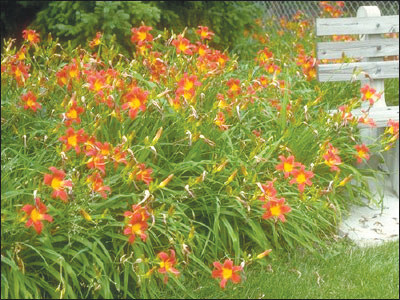Darling daylilies
GREEN COVE SPRINGS – One common perennial seen throughout the landscapes of the United States is the daylily. They are popular due to their extensive number of varieties to choose from, their grass …
This item is available in full to subscribers.
Attention subscribers
To continue reading, you will need to either log in to your subscriber account, or purchase a new subscription.
If you are a current print subscriber, you can set up a free website account and connect your subscription to it by clicking here.
If you are a digital subscriber with an active, online-only subscription then you already have an account here. Just reset your password if you've not yet logged in to your account on this new site.
Otherwise, click here to view your options for subscribing.
Please log in to continueDon't have an ID?Print subscribersIf you're a print subscriber, but do not yet have an online account, click here to create one. Non-subscribersClick here to see your options for subscribing. Single day passYou also have the option of purchasing 24 hours of access, for $1.00. Click here to purchase a single day pass. |
Darling daylilies
GREEN COVE SPRINGS – One common perennial seen throughout the landscapes of the United States is the daylily. They are popular due to their extensive number of varieties to choose from, their grass like texture, and their showy flowers. Often planted in large groupings of 10 or more, these plants make striking landscape statements when in bloom.
Choosing a daylily can be a difficult situation, as there are so many to choose from and some may perform better than others. If you would like to find out more information about Florida daylily societies and varieties, visit http://www.daylilies.org/AHSreg12.html.
Overall, there are three main types of foliage growth – dormant, evergreen, and semi-evergreen. Dormant daylilies will die back after frost and regrow, evergreens will remain green throughout the year, and semi evergreens can do either depending on location. With flowers, they can be found in multiple colors and sizes, ranging from a couple of inches up to 10 inches. You can even find some varieties that curl like a rose or have more of a spider lily appearance.
When choosing a location for your plants, they can grow in a variety of conditions based on variety. Light colored daylilies should be planted in full sun while darker colored varieties should have partial shade. A great location for these plants is under the dappled shade of pine trees. Do not plant them in full shade.
When preparing the bed for planting, amend the area with 3-4 inches of peat or compost and add in about ¾ to 1 pound of fertilizer with a 3:1:2 Nitrogen-Phosphorous-Potassium ratio. Soil pH should be between 6.2-6.8 so contact your local UF/IFAS Extension Office for soil testing.
Once the soil is ready, you can plant your daylilies. If bare root, remove foliage 6-8 inches from the crown and trim the plant into an inverted v shape. Next, dig a hole larger than the root mass of the plant and make a mound in the center of the hole which you will spread the roots of the lily over. Finally, place soil back over the roots and make sure the crown of the plant is at ground level. Planting is similar with potted lilies, except you will not need to worry about the mound. Once planted, water well, mulch, and keep the soil moist until the plants are established. The best times to plant are the spring and fall.
Once established, daylilies can be very drought tolerant but extensive dry weather will reduce the vigor and blooming of the plant so irrigate as needed during the summer heat. Fertilizer should be applied fall, early spring, and mid-summer with the same amount and same product as the one used at planting. Some insects, such as thrips, aphids and spider mites may cause some issues in the plants but are usually not severe. There is one disease that can cause loss of quality, Daylily Rust, so look for varieties that are resistant. Another major pest of the daylily is the whitetail deer, so it you have a deer issue, your daylilies may be a favorite food source.
Another great feature of daylilies is that as they grow, they can be separated into more of the same variety and spread through your garden. Seeds can also be used to grow daylilies but it will take around two years until they flower. For more extensive information on Daylilies, visit: edis.ifas.ufl.edu/ep006.
If you have any questions about the Master Gardener program, landscape and garden topics, or need plant or pest materials identified, contact the University of Florida/IFAS Extension Office online at http://www.clay.ifas.ufl.edu, follow us on Facebook, or call by phone at (904) 284-6355.








